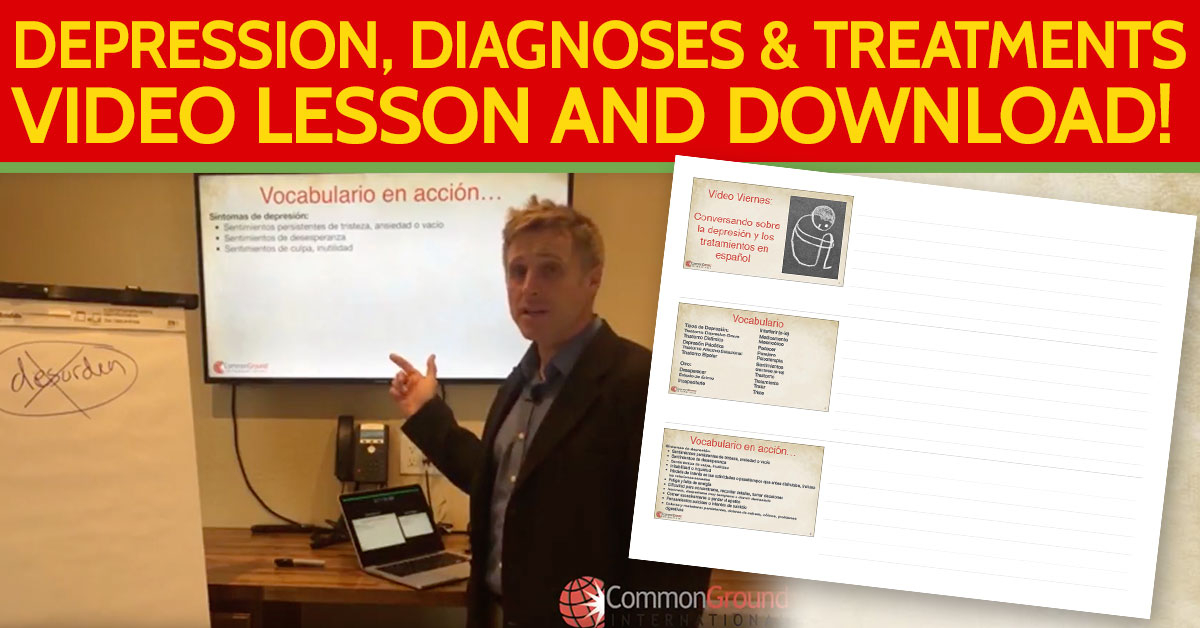This is Lesson 1 of 5 in our Mental Health in Spanish series.
In this free Medical Spanish lesson you will learn how to talk about depression with your patients in Spanish: Cómo hablar sobre la depresión en español con tus pacientes.
In this lesson we’re looking at:
- The SIG E CAPS acronym to assess mood in Spanish
- The PHQ-9 instrument (in Spanish) for depression screening
- Vocabulary and questions to describe mood in Spanish
- Titles of various mental health providers in Spanish
- Describing types of therapies in Spanish
- Describing antidepressants in Spanish
Here is the Discussing Depression in Spanish lesson that I taught on YouTube and to our Facebook group:
Subscribe to our YouTube Channel to see all of our lessons and get the latest videos right away!
Emociones: ¿Cómo se siente? – Emotions: How do you feel?
Let’s start with a basic vocabulary about emotions in Spanish. We have a handful of emotions here, but none of them are positive since we are focusing on the other end of the spectrum.
| Spanish | English |
| Aburrido/a | Bored |
| Agitado/a | Agitated |
| Agotado/a | Drained |
| Ansioso/a | Anxious |
| Así, así | So, so |
| Cansado/a | Tired |
| Confundido/a | Confused |
| Decaído/a | Physically and emotionally low |
| Deprimido/a | Depressed |
| Desesperado/a | Hopeless |
| Entumecido/a | Numb |
| Enfermo/a | Sick, ill |
| Enojado/a | Angry |
| Frustrado/a | Frustrated |
| Igual | The same |
| Inquieto/a | Restless |
| Inseguro/a | Unsafe |
| Insensibilizado/a | Metaphorically numb |
| (muy) Mal | (very) Bad, not well, ill |
| Más o menos | More or less |
| Nervioso/a | Nervous |
| Peor | Worst |
| Preocupado/a | Worried |
| Regular | Just ok |
| Solitario/a | Lonely, alone |
| Triste | Sad |
PHQ-9 Question: ¿Se ha sentido decaído(a), deprimido(a), o sin esperanzas?
Have you felt physically and emotionally low, depressed and hopeless?
Vocabulario Útil… – Useful Vocabulary
In this section, we are going to learn how to use other verbs to ask about feelings.
Verbos útiles con emociones:
- Estar: (To be)
- ¿Está… ? – Are you…?
- ¿Ha estado…? – Have you been…?
- Sentirse (e-ie): (To feel)
- ¿Se siente… ? – Do you feel…?
- ¿Se ha sentido… ? – Have you felt…?
- Tener (e-ie): (To have)
- ¿Tiene… ? – Do you have…?
- ¿Ha tenido…? – Have you had…?
Duración/Frecuencia de tiempo:
- Casi todos los días / Almost every day
- Con frecuencia / Frequently
- De vez en cuando / From time to time
- En los últimos meses / In the recent months
- En las últimas semanas / In the last or recent weeks
- Más de la mitad de los días / More than half of the days
- Nunca / Never
- Recientemente / Recently
- Todo el día / All day long
Ejemplos de uso:
- ¿Se ha sentido culpable las últimas semanas? / Have you felt guilty in the recent weeks?
- ¿Se siente triste más de la mitad de los días? / Do you feel sad more than half of the days?
Acrónimo SIG E CAPS
This acronym is useful to talk through and figure out where someone’s at emotionally.
- S: Sleep – Sueño
- I: Interest – Interés
- G: Guilt – Culpa
- E: Energy – Energía
- C: Concentration – Concentración
- A: Appetite – Apetito
- P: Psychomotor – Psicomotor
- S: Suicide – Suicidio
Sleep – Sueño
Unas preguntas comunes sobre el sueño:
- ¿Ha tenido dificultad para dormir? – Have you had difficulty sleeping?
- ¿Ha tenido dificultad para dormirse? – Have you had difficulty falling asleep?
- ¿Duerme bien? – Do you sleep well?
- ¿Cuántas horas duerme por noche? – How many hours at night do you sleep?
- ¿Es más o menos de lo normal? – Is that more or less than normal?
- ¿Se despierta en la noche? – Do you wake up at night?
- ¿Por qué piensa que no duerme bien? – Why do you think you are not sleeping well?
PHQ-9 Question: ¿Ha tenido dificultad para quedarse o permanecer dormido(a)? ¿O ha dormido demasiado?
Have you had trouble falling or staying asleep? Or have you slept too much?
Interest – Interés
Unas preguntas comunes sobre los intereses del paciente:
- ¿Qué cosas le gustan hacer? – What things do you enjoy doing?
- Ha cambiado su interés en actividades que antes disfrutaba? – Has your interest level changed in activities you previously enjoyed?
- ¿Ha perdido interés en algo? – Has you lost interest in anything?
- ¿Ha tenido menos interés en algo? – Have you had less interest in something?
- ¿Ha notado menos deseo sexual? /¿una bajada en la libido? – Have you noticed less sexual desire or a lower libido?
PHQ-9 Question: ¿Ha tenido poco interés o placer en hacer cosas?
Have you had little interest or pleasure in doing things?
You can get all the SIG E CAPS acronym questions and the PHQ-9 Test by downloading the lesson notes right away…
Unas realidades sobre la inmigración – Some realities about immigration
When we think about life events and life situations that contribute to developing depression, it’s a good idea to think about some realities about immigration because there is a possibility that a connection exists between them.
Es probable que un inmigrante experimenta/vive – It is likely that an immigrant experiences / lives:
- Inestabilidad en el trabajo – instability at work
- Múltiples trabajos – multiple jobs
- Inestabilidad del hogar – housing instability
- Separación de familiares – familial separation
- Traumas durante inmigración – Traumas during immigration
- Ingresos bajos – Lower income
- Dificultades sistémicas en buscar atención médica – Systemic difficulties in seeking medical attention
¿Ha pasado algún cambio grande en la vida recientemente? – Has there been a big change in life recently?
When you think about those life situations that might be contributing to depression, you might ask questions regarding the following topics:
- Muerte – Death
- Divorcio – Divorce
- Demasiadas responsabilidades – Too many responsibilities
- Mudarse – Moving
- Enfermedades graves – Serious illnesses
- Pérdida de empleo o problemas en el trabajo – Job loss or problems at work
- Problemas con finanzas – Financial issues
- Problemas con otros miembros de la familia – Issues with other family members
Now let’s talk about medication – Medicamentos
¿Alguna vez ha tomado un antidepresivo? – Have you ever tried taking an antidepressant?
- ¿Cómo le fue? – How did it go?
- ¿Le ayudó? – Did it help?
- ¿Se sintió mejor? – Did you feel better?
Los antidepresivos – Antidepressants
- Inhibidores selectivos de recaptación de serotonina – Selective serotonin reuptake inhibitors
- Prozac, Celexa, Zoloft
- Inhibidores selectivos de recaptación de serotonina y norepinefrina – Selective serotonin and norepinephrine reuptake inhibitors
- Effexor, Cymbalta
- Tricíclicos – Tricyclic
- Inhibidores de monoamino oxidasa – Monoamine oxidase inhibitors
Apuntes – Notes
When talking about medications, specially antidepressants, you might find yourself expressing some of these instructions:
- Es muy importante tomar los medicamentos como están indicados.
- It’s very important to take medications as directed.
- Cuando empieza un medicamento nuevo, es normal tardar hasta 3-4 semanas para sentir los efectos del medicamento.
- When you are starting a new medication, it is normal to take up to 3-4 weeks to feel the effects of the medication.
Psicoterapia y Profesionales – Psycotherapy & Professionals
- Asociado médico psiquiátrico – Psychiatric PA
- Consejero(a) certificado – Certified counselor
- Consejero pastoral – Pastoral counselor
- Enfermera de práctica avanzada psiquiátrica – Psychiatric MP
- Proveedor de salud mental – Mental Health provider
- Psicólogo(a) – Psychologist
- Psiquiatra – Psychiatrist
- Terapeuta familiar y de matrimonios Marriage and Family therapist
- Trabajador social – Social worker
Some questions about therapy:
¿Alguna vez ha intentado la terapia (consejería, asesorías) con un terapeuta certificado? – Have you ever tried therapy with a certified therapist?
- ¿Cómo le fue? – How did it go?
- ¿Le ayudó? – Did it help?
- ¿Se sintió mejor? – Did you feel better?
¿Le gustaría que le remitiera a un proveedor de salud mental certificado? – Would you like me to I refer you to a certified mental health provider?
Terapias para la depresión – Therapies for Depression
Hay dos tipos principales de psicoterapia: de corto plazo (10-20 semanas) o de largo plazo (más tiempo 🙂
1. Terapia cognitivo-conductual – Cognitive Behavioral Therapy
- Hay una énfasis en enseñar nuevas maneras de pensar y comportarse.
- There is an emphasis on teaching new ways of thinking and behaving.
- Ayuda a las personas a cambiar sus pensamientos y comportamientos negativos por un estilo de pensar y portarse más positivo.
- It helps people change their negative thoughts and behaviors into a more positive way of thinking and behaving
2. Terapia interpersonal – Interpersonal Therapy
- Ayuda a las personas a entender y resolver relaciones personales que pueden causar o empeorar su depresión.
- It helps people understand and resolve personal relationships that either cause or worsen their depression.
More relevant vocabulary – Más vocabulario relevante
| Spanish | English |
| El autocuidado | Selfcare |
| El ejercicio | Exercise |
| El sueño | Sleep |
| La aceptación | Aceptance |
| La atención | Attention, Mindfulness |
| La conexión familiar | Family connection |
| La conexión social | Social connection |
| La dopamina | Dopamine |
| La higiene | Hygiene |
| La nutrición | Nutrition |
| La participación social | Social engagement |
| La serotonina | Serotonin |
| Las habilidades para enfrentar situaciones en la vida | Coping skills |
| Los ejercicios para relajarse | Relaxation exercises |
| Químicos en el cerebro | Chemicals in the brain |
Su tarea – Your Homework
- Talk through SIG E CAPS and/or the PHQ-9 with your conversation partner
- Ask the questions
- Use the vocabulary
- Talk about treatment options
Now it’s your turn! I packaged all of this vocabulary in Spanish into some flashcards for you to study.
I packaged all of this into easily downloadable .pdf notes–>Get your copy for free today!
Keep up the good work speaking responsible Spanish to your patients! Check out our other books, classes & products to help you learn medical Spanish!
*If the link isn’t working for you, you may need to unblock pop-ups in your browser settings
Other posts in this Mental Health series:
How to Evaluate Depression in Spanish using SIG E CAPS
This Medical Spanish lesson teaches you how to evaluate depression in Spanish using SIG E…
Questions and Phrases to Assess Child Abuse and Neglect in Spanish
This Medical Spanish lesson focuses on learning how assess child abuse and neglect in Spanish….
Mental health Conversation in Spanish – Listening Comprehension
Work on your listening comprehension in Spanish and learn about the mental health situation in…
How to Teach Coping Strategies in Spanish
Coping strategies in Spanish are “Estrategias de afrontamiento”. This week, as I was preparing to…
PHQ 9 and GAD 7 for depression and anxiety screenings in Spanish
Screening for depression and anxiety with the PHQ-9 and GAD-7 in Spanish. Do you ever…
Discussing ADD and ADHD in Spanish
ADD in Spanish is “TDA: el trastorno de déficit de atención” and ADHD is “TDAH:…
Discussing PTSD in Spanish
PTSD in Spanish PTSD is lesson 4 in our 5-lesson series on discussing mental health…
Discussing Substance Abuse in Spanish
In today’s lesson, we’re addressing topic #3 from the mental health survey that our community…
Discussing Anxiety in Spanish
This is Lesson 2 of 5 in our Mental Health in Spanish series. In this…
Mental Health Conversations in Spanish
In this free Medical Spanish lesson you will learn how to have Mental Health Conversations…
Explaining Depression Diagnoses & Treatments in Spanish
This Medical Spanish lesson focuses on explaining the depression diagnoses and treatments in Spanish to…














